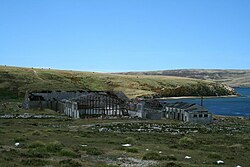Ajax Bay | |
|---|---|
 Some of the remaining buildings in 2008 | |
| Coordinates: 51°33′56″S59°4′48″W / 51.56556°S 59.08000°W | |
| Country | |
| British Overseas Territory | |
| Region | East Falkland |
Ajax Bay is an abandoned former refrigeration plant and wartime landing point on the north-west coast of East Falkland in the Falkland Islands, facing San Carlos Water a few miles from Port San Carlos. It was previously a settlement, surrounding the plant, which was developed by the Colonial Development Corporation in the 1950s, also responsible for developing Port Albemarle. It was supposed to freeze Falkland mutton, but this was found to be economically unviable. Many of the pre-fabricated houses were moved to Stanley. [1]





